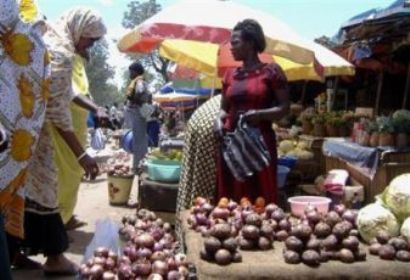Ugandan traders attempt to block S. Sudan’s bid to join EAC
November 4, 2013 (KAMPALA) – A group of Ugandan traders has summoned five members of the East African Community (EAC) before a regional court, seeking to block South Sudan’s entry into the bloc.

The traders have sued the Attorney Generals of Uganda, Rwanda, Kenya, Burundi, Tanzania and the Secretary General of the EAC over the matter.
“We are saying before South Sudan is admitted they should clean up their house”, said Patrick Walusimbi, Chairman UTASS in an interview with Sudan Tribune on Monday.
Walusimbi says South Sudan’s national government, the state governments and several influential individuals in the Sudan People’s Liberation Army (SPLA) owe members of his association $14.8 million, which they allegedly declined to pay.
“We need to be paid. We need justice. There are several traders who supplied goods in South Sudan but have not been paid. South Sudan should also improve on its human rights record”, said Walusimbi.
“In some instances, we have clear cases with clear judgments by South Sudan courts ordering that we be paid but these judgements have not been enforced by the South Sudan government. It is the reason we have gone to the East African Court of Justice”, he added.
The traders, their chairman said, previously channeled their grievances through the Ugandan government, but the latter reportedly proved unhelpful.
“We have been complaining for a long time. Now is time for action”, he stressed.
Walusimbi said the goods that have not been paid for in South Sudan were supplied by Ugandan traders between 2005-2009.
SOUTH SUDAN’S EAC APPLICATION
The EAC is a regional intergovernmental organisation with headquarters in Arusha, Tanzania. The body comprises of Tanzania, Rwanda, Burundi, Kenya and Uganda.
South Sudan applied to join the community shortly after attaining independence from Sudan in July 2011.
Member states will begin discussions on South Sudan’s admissions on Thursday this week.
The East African Treaty requires that members accept the ‘‘community as set out in the treaty; adhere to good governance, democracy, rule of law and respect for human rights; and establishment and maintenance of a market driven economy’’ as conditions for joining the community.
Last month, foreign affairs ministers from Uganda, South Sudan, Kenya and Rwanda signed a memorandum of understanding (MoU) in Kigali, Rwanda, which is expected to boost business among partner states.
“I declare that those with Rwandan passports and the whole of East Africa will no longer need visas to travel to South Sudan”, South Sudan president Salva Kiir was quoted saying at the summit in Kigali.
EAC BENEFITS FOR SOUTH SUDAN
Analysts say South Sudan stands to gain a lot from the EAC once its admitted into the regional integration. The young nation would, for instance, have access to a market of 140 million people.
South Sudan would also be able to benefit from existing infrastructure such as roads, ports, railways and airports, an analyst noted.
However, South Sudan’s admission to the community would also come at a cost for the young nation, observed a paper from the Brooklyn Institute; an US-based organisation which specialises in conducting research.
“Some South Sudanese citizens have expressed concerns about potential lost jobs, revenue, business and industry to the more developed nations of the EAC’’, says the Brooklyn Institute paper titled ‘‘South Sudan’s Quest for regional integration’’.
The paper argues that fear for the loss of jobs by South Sudanese is based on the fact that literacy rate in the country stands at 27% compared to Kenya, Uganda and Tanzania which stand at 87%, 73% and 72% respectively.
SPANNER INTO THE WORKS FOR SOUTH SUDAN’S EAC APPLICATION
Caleb Alaka, a prominent Ugandan lawyer told Sudan Tribune that the suit by Ugandan traders could throw a spanner into the works for South Sudan’s application to join the EAC.
‘‘The suit is a possible threat to South Sudan’s admission because the East African Court of Justice has jurisdiction over the member states. The court will not order South Sudan because the country is not within its jurisdiction, but it can order the partner states’’, Alaka said on Monday.
Ugandan traders in South Sudan have for long complained of mistreatment in the country. South Sudanese authorities say some of the Ugandans are engaged in unlawful acts such as robbery.
But what appears to have recently caused tension between the two countries is the August order in which South Sudan’s interior minister ordered foreigners engaged in commercial motorcycle business to halt the practice.
About 1,600 Ugandans were affected by the order.
Following the order, however, South Sudan and Uganda have been engaged in bi-lateral talks to address the fall-out. A planned visit by Uganda’s foreign affairs minister to the South Sudan capital, Juba is still on the table.
(ST)
